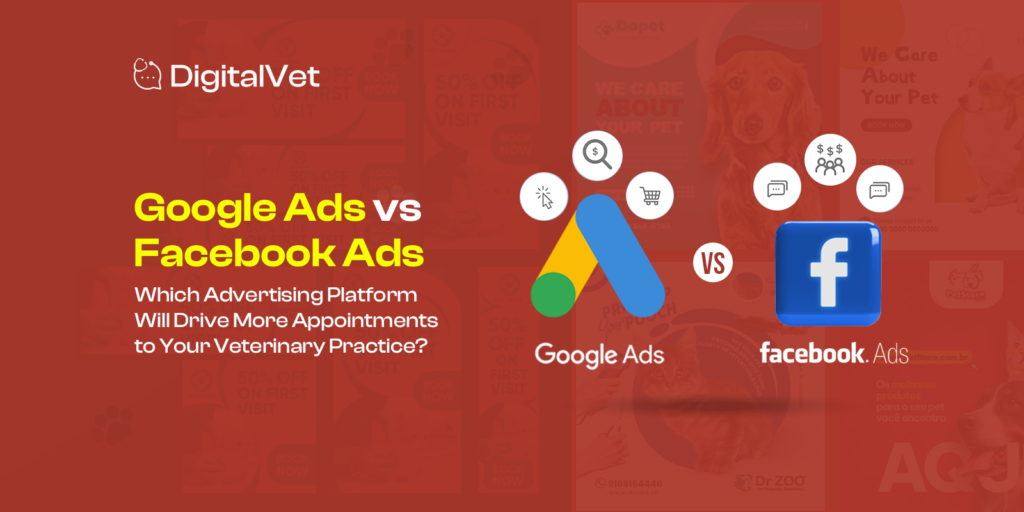Pet owners are increasingly turning to the internet to find the best care for their pets, which means your veterinary practice needs to stand out online. But when it comes to digital advertising, how do you know where to invest your budget—Google Ads or Facebook Ads? Choosing the wrong platform could lead to wasted money and missed opportunities to attract new clients.
In this blog, we’ll break down the pros and cons of both Google Ads and Facebook Ads, guiding you through how each can help grow your veterinary practice. By the end, you’ll have a clear idea of which platform is the right fit for your clinic to drive new clients and boost your online presence.
Running a veterinary practice means more than just offering excellent care—it’s about finding and attracting pet owners who need your services. In today’s digital age, that means advertising online. But many practices struggle with deciding which platform will help them get the best return on investment: Google Ads or Facebook Ads?
Choosing the wrong platform could leave your ads unseen by the right audience, wasting both time and money. Worse, it could mean potential clients are finding your competitors instead.
You’ve probably experienced the frustration of launching an ad campaign, only to see little engagement or conversion. Perhaps your Google Ads didn’t bring in as many clicks as you expected, or your Facebook Ads didn’t reach the right pet owners. It feels like you’re throwing money into the void without knowing if your efforts are actually making an impact.
Your competitors, meanwhile, are visible to your ideal clients, and you’re left wondering what went wrong.
But what if there was a way to clearly understand which platform would work best for your specific practice? Let’s explore both Google Ads and Facebook Ads, so you can make an informed decision and see your advertising dollars truly pay off.
Imagine this: Your veterinary practice consistently ranks at the top of search results when pet owners are actively looking for a vet, thanks to Google Ads. Or, your Facebook Ads are creating a vibrant community of engaged pet lovers who regularly interact with your posts, making your clinic their top choice when they need care.
With the right platform, your practice could experience a significant boost in visibility, more appointments, and long-term client loyalty.
Here’s how each platform can help you achieve that success:
Google Ads: Targeting Clients Who Are Ready to Act
- Intent-Driven Advertising: Google Ads lets you target pet owners who are actively searching for veterinary services. When someone types in “veterinary clinic near me,” your ad could appear right when they need your help the most. This intent-driven approach means higher conversion rates and immediate results.
- Local Targeting for Maximum Impact: Google Ads allows precise local targeting, ensuring your practice shows up in front of pet owners in your community. Using location extensions and geo-targeting, you can make sure you’re visible to the people who are most likely to visit your clinic.
- Data-Driven Results: Google provides detailed analytics, allowing you to track your ad performance in real time. Metrics like click-through rates (CTR), conversion rates, and return on ad spend (ROAS) give you the insight you need to refine your campaigns and maximize effectiveness.
Facebook Ads: Building Engagement and Brand Awareness
- Broad Audience Reach: Facebook Ads allow you to reach a massive audience, including those who may not be actively searching for veterinary services but could become potential clients. Facebook’s large user base makes it ideal for brand awareness and engagement.
- Advanced Targeting Capabilities: Facebook’s advanced targeting tools enable you to reach specific demographics, interests, and behaviors. You can target pet owners who have shown interest in pet-related content, ensuring that your ads reach the right audience.
- Emotional Connections Through Visual Storytelling: Facebook Ads give you the freedom to create visually engaging ads that tell your practice’s story. You can showcase your clinic, highlight client testimonials, or share educational content that resonates emotionally with pet owners, fostering trust and connection.
Which Platform is Right for Your Practice?
Choosing between Google Ads and Facebook Ads depends on your goals, budget, and target audience. If your priority is to capture clients who are actively searching for veterinary services, Google Ads is the clear choice. However, if you want to build a community and engage pet owners early on, Facebook Ads could be the better option.
Budget Considerations:
- Google Ads: May be more expensive due to keyword competition, especially for terms like “veterinary services.” However, the higher cost often translates to higher-intent clicks and quicker conversions.
- Facebook Ads: Generally has a lower cost-per-click, making it ideal for practices with tighter budgets or those looking to maximize engagement over time.
Target Audience:
- Google Ads: Ideal for capturing high-intent users actively searching for veterinary services.
- Facebook Ads: Great for reaching younger pet owners or those active on social media who may not yet be actively looking for a vet but fit the profile of potential clients.
Testing Both Platforms:
Why choose one when you can test both? Run small campaigns on each platform and analyze the results. This approach lets you see which resonates more with your specific audience and delivers the best ROI.
Both Google Ads and Facebook Ads have unique strengths that can help your veterinary practice attract new clients and grow your digital presence. Whether you choose Google’s intent-driven approach or Facebook’s engagement-focused ads, the key is understanding your audience and goals.
For the best results, consider incorporating both platforms into your advertising strategy. By doing so, you can capture both high-intent pet owners and build long-term relationships with future clients, ensuring your veterinary practice stands out in a competitive market.
